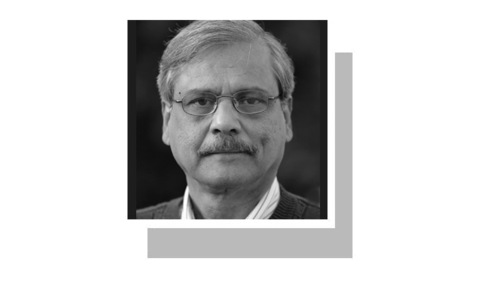WASHINGTON: The political turmoil in Pakistan echoed far away in the United States as well, where the UN chief urged Islamabad to keep the legal process impartial while the State Department underlined the need to follow “democratic, constitutional and legal” principles.
The controversy that followed PTI chief Imran Khan’s controversial remarks against a female judge and the Islamabad police also drew the attention of the US media and Washington’s think tanks, where experts urged ruling and opposition forces in Pakistan not to rock the boat.
On Monday afternoon, the issue came up at a UN news briefing in New York as well when a reporter asked if the UN chief was aware of the recent political developments in Pakistan. Stéphane Dujarric, the spokesperson for Secretary General Antonio Guterres, said the UN chief was “aware” of the charges brought against Imran Khan and emphasised the “need for a competent, independent and impartial legal process”.
“The secretary general urges calm, lowering of tensions and respect for the rule of law, human rights and fundamental freedoms,” he said.
UN chief wants impartial legal process for Imran; State Department urges following ‘democratic, legal principles’
At the US State Department, spokesman Ned Price said Washington was also aware of the charges against Imran Khan, but considered it “a matter for the Pakistani legal and judicial system”. “It is not directly a matter for the US, and that’s because we don’t have a position on one political candidate or party versus any other political candidate or party,” Mr Price said at a press briefing.
The United States, he said, supports the peaceful upholding of democratic, constitutional, and legal principles in Pakistan and around the world.
In his address on Saturday evening, Imran Khan threatened to file cases against Islamabad police and also warned the judiciary that it would have to face the consequences for its alleged ‘biased’ attitude against his party. The judiciary took strong exception to Imran Khan’s outburst against a female judge and initiated contempt of court proceedings against him.
In a report on the current situation in Pakistan, The New York Times commented that “the move against Imran Khan is a major escalation of the power struggle between the government and the former leader and risks renewed public unrest.”
The Washington Post noted that “the power struggle between Pakistan’s government and its ousted prime minister has escalated dramatically, with authorities targeting the pro-Khan press”.
Bloomberg, a US-based financial news wire, reported: “Pakistan’s dollar-denominated bonds took a hit along with its currency and stocks, after the government said it is considering legal action against the former prime minister.”
In Washington, however, people were more concerned about the impact of this conflict on Pakistan’s ailing economy.
Prof Touqir Hussain, who teaches international relations at the Georgetown University, noted that the economy “has been in trouble since long” before the PTI-PDM conflict started. But he warned that “the confrontation is creating economic uncertainty, political instability and potential civil unrest, which is hardly an environment for improvement of the economy”.
Madiha Afzal, a scholar of Pakistan and Afghanistan affairs at the Brookings Institution in Washington, urged the government to focus on flood victims and other pressing issues.
“There is no bigger priority. Yet its focus is on political point-scoring,” she wrote in a tweet. “What would be the best for Pakistan? For the major political parties to sit down and deescalate the situation. But it’s very unlikely to happen.”
Published in Dawn, August 24th, 2022















































